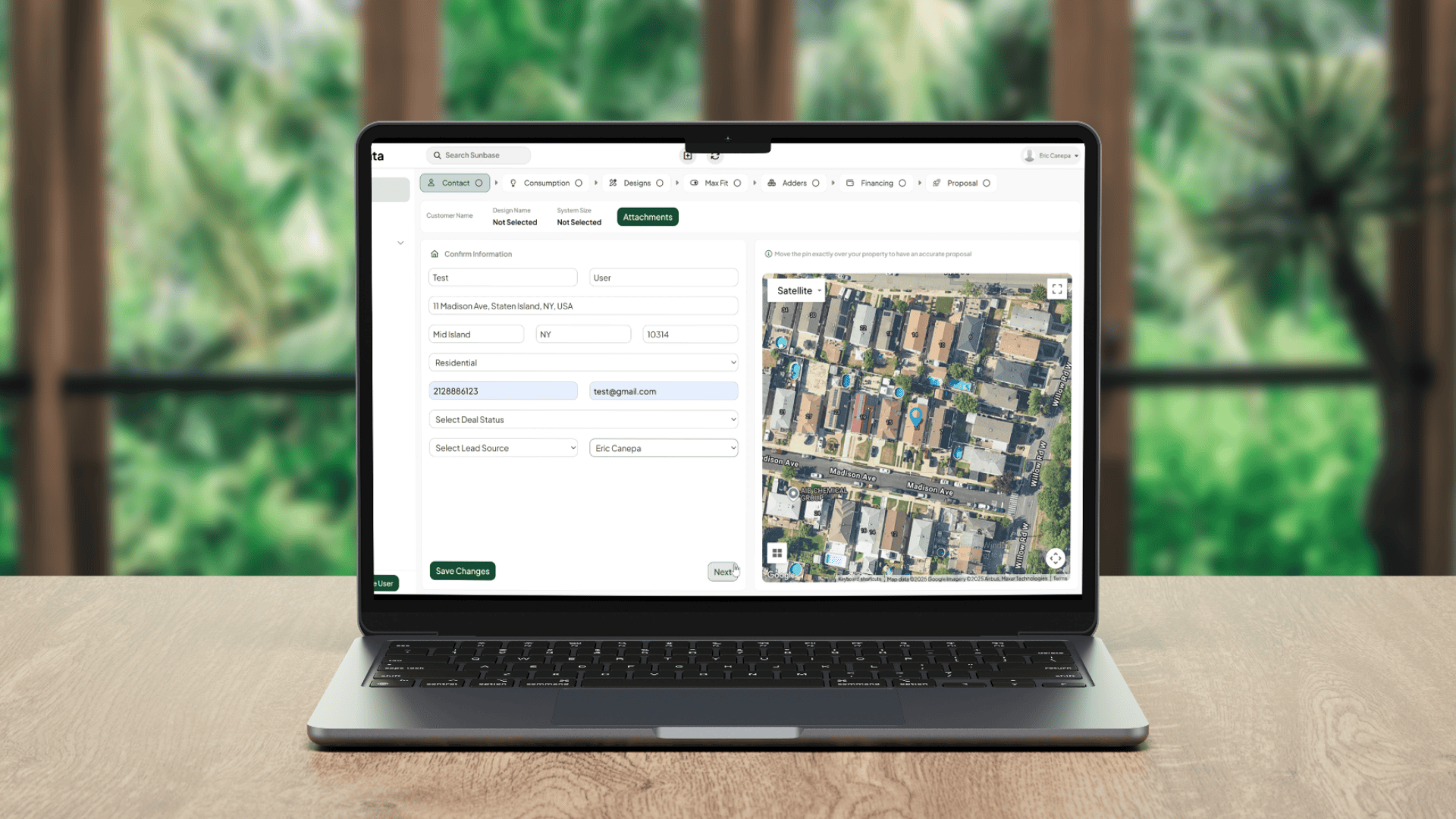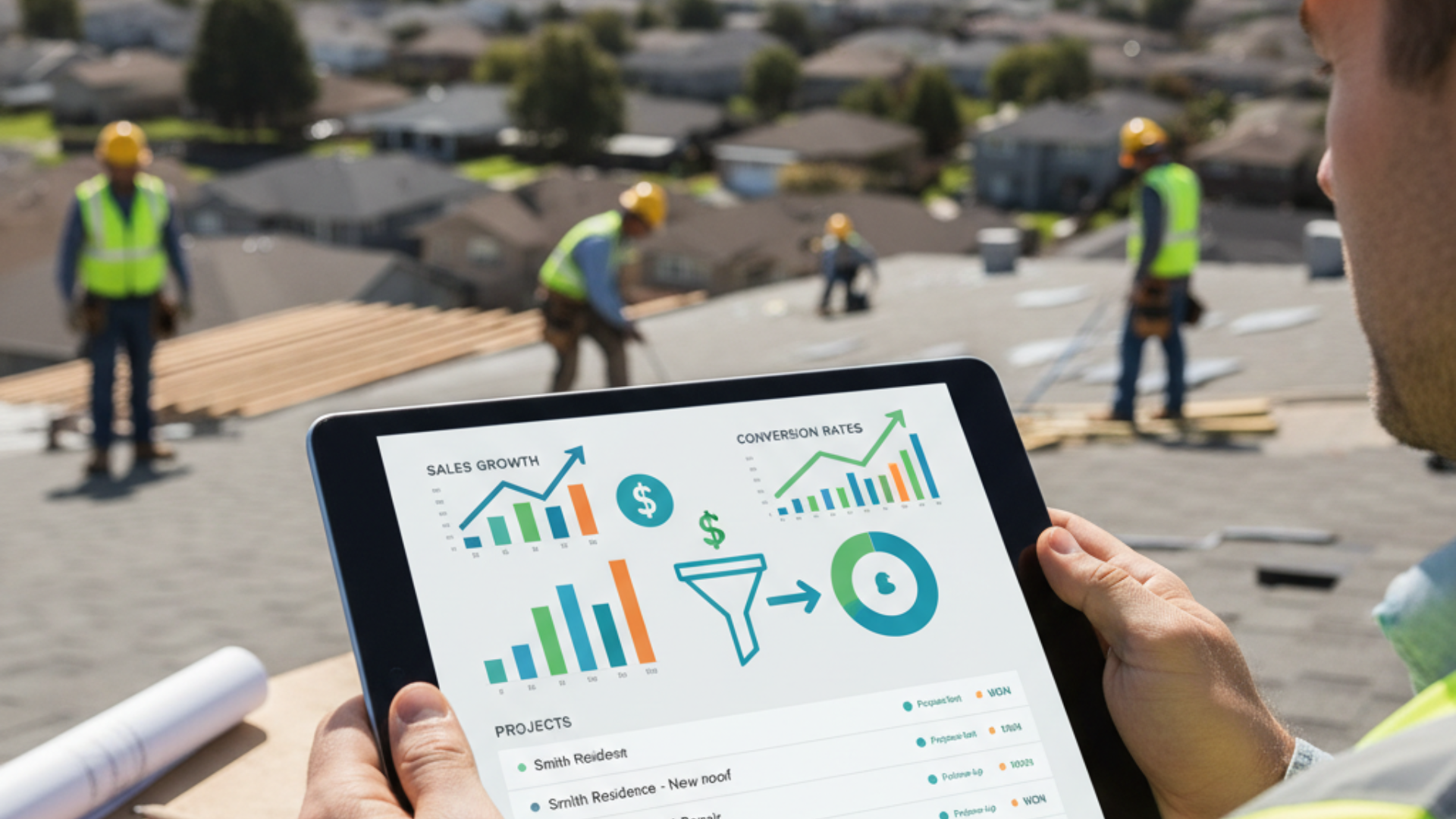March 19, 2025
EPC (Engineering, Procurement, and Construction) companies are the backbone of solar project execution. They handle everything from solar system design and material procurement to installation and commissioning, ensuring projects are completed on time and within budget.
As solar projects become complex, EPCs utilize end-to-end solar management software to streamline operations. Wondering what difference does it make? This shift toward digitalization and automation improves efficiency, reduces costs, and enhances collaboration.
These platforms provide a comprehensive solution for monitoring, controlling, and automating energy systems, resulting in cost savings, lower carbon emissions, and better battery management during outages.
Let's find out why EPC companies heavily invest in comprehensive solar management platforms and how these tools help overcome traditional project challenges.
Key Takeaways
- EPCs face major challenges in project management, coordination, and cost control.
- End-to-end solar software helps streamline operations from design to maintenance.
- Automation and data integration improve efficiency, reduce errors, and enhance decision-making.
- Adopting the right software is crucial for EPCs to stay competitive and scale effectively.
The Challenges Faced by EPCs in Solar Projects
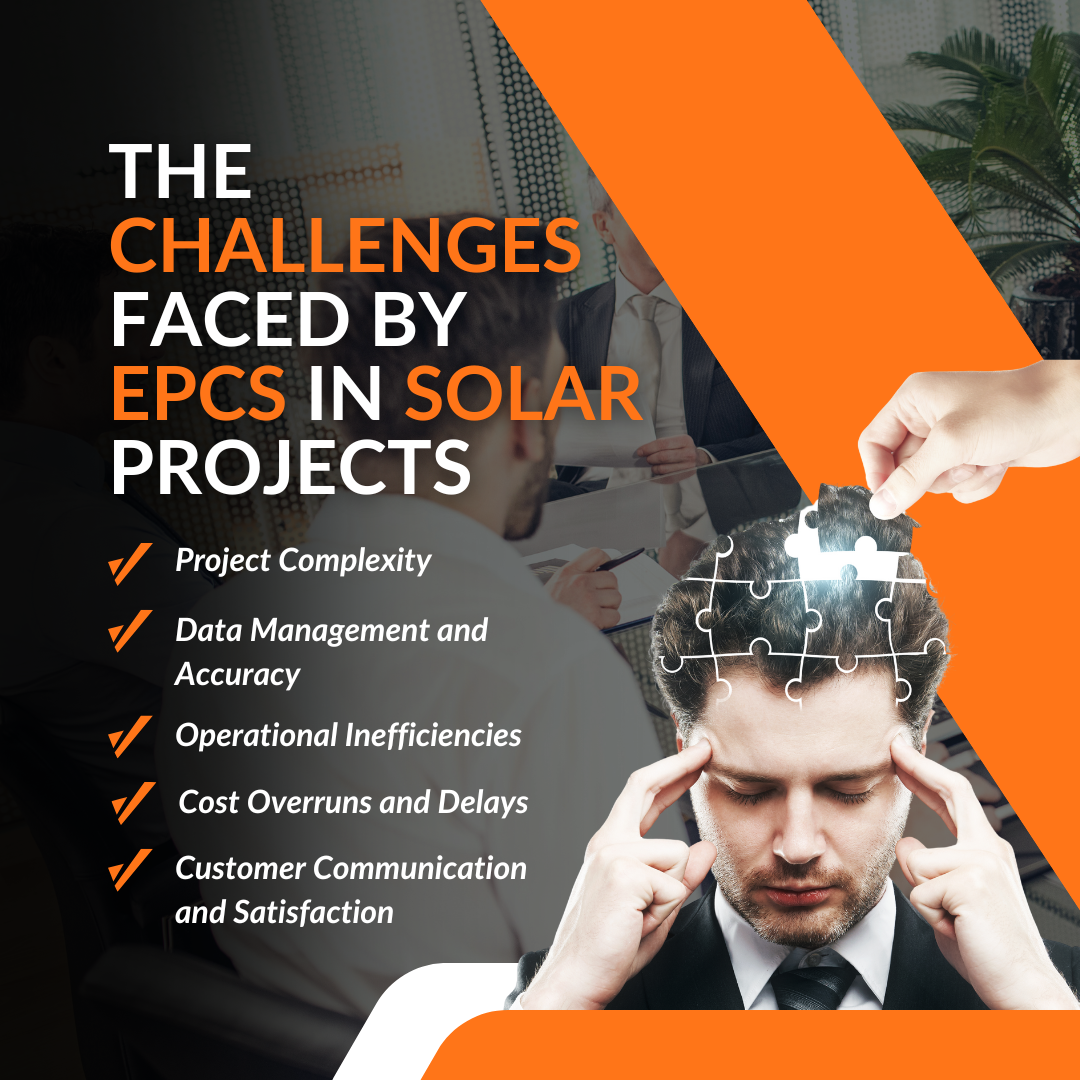
Managing solar projects involves multiple moving parts. From handling logistics and stakeholders to ensuring accurate data tracking, EPCs often struggle with inefficiencies that impact project timelines and profitability.
A. Project Complexity
EPCs juggle many responsibilities, complicating execution.
1. Managing stakeholders
Developers, suppliers, installation teams, and customers must align, increasing coordination.
2. Coordinating logistics and timelines
Material procurement, transportation, and on-site execution require precise scheduling to avoid delays.
3. Handling various project sizes and types
From utility to large-scale commercial projects, EPCs need flexible solutions scopes.
B. Data Management and Accuracy
1. Tracking vast amounts of data
Tracking vast amounts of data across project phases, including designs, procurement records, invoices, and performance reports.
2. Ensuring data accuracy
Manual data entry can lead to inconsistencies and errors, making it difficult to track project performance effectively.
3. Difficulty in generating timely reports
Without centralized data, generating accurate reports for decision-making can be slow and inefficient.
C. Operational Inefficiencies
1. Siloed communication and workflows
Teams often work in isolation, leading to miscommunication and duplicated efforts.
2. Manual processes leading to errors and delays
Relying on spreadsheets and paper-based documentation slows down operations.
3. Difficulties with field crew management
Coordinating on-site teams, ensuring compliance, and tracking work progress in real time can be challenging.
D. Cost Overruns and Delays
1. Unexpected changes and variations
Design changes, site conditions, and material shortages can increase costs.
2. Inefficient resource allocation
Poor planning can result in workforce or material shortages, leading to project delays.
3. Supply chain disruptions
Issues with material availability or supplier delays can derail project schedules.
E. Customer Communication and Satisfaction
1. Keeping customers informed
Clients expect real-time updates on project progress. Without structured communication, customer satisfaction suffers.
2. Managing expectations and inquiries
Handling customer queries efficiently is essential to maintaining trust and reducing misunderstandings.
The Solution: End-to-End Solar Management Software
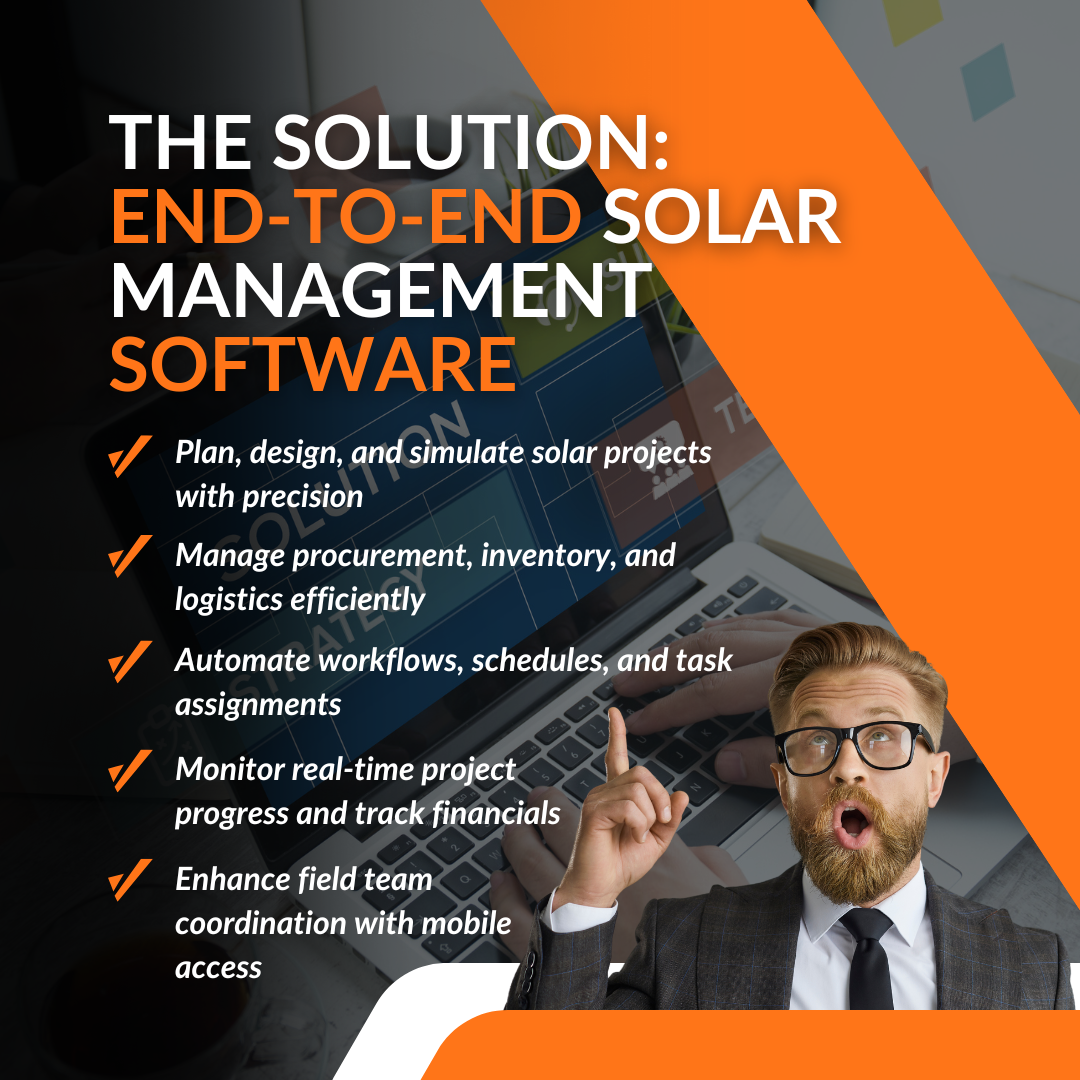
End-to-end solar management software is an integrated digital platform designed to streamline, automate, and centralize all solar project workflows, optimizing the performance and management of solar assets.
From initial design and procurement to installation, monitoring, and maintenance, this software ensures seamless execution of solar projects while improving efficiency, reducing costs, and enhancing collaboration.
Key Features of End-to-End Solar Management Software
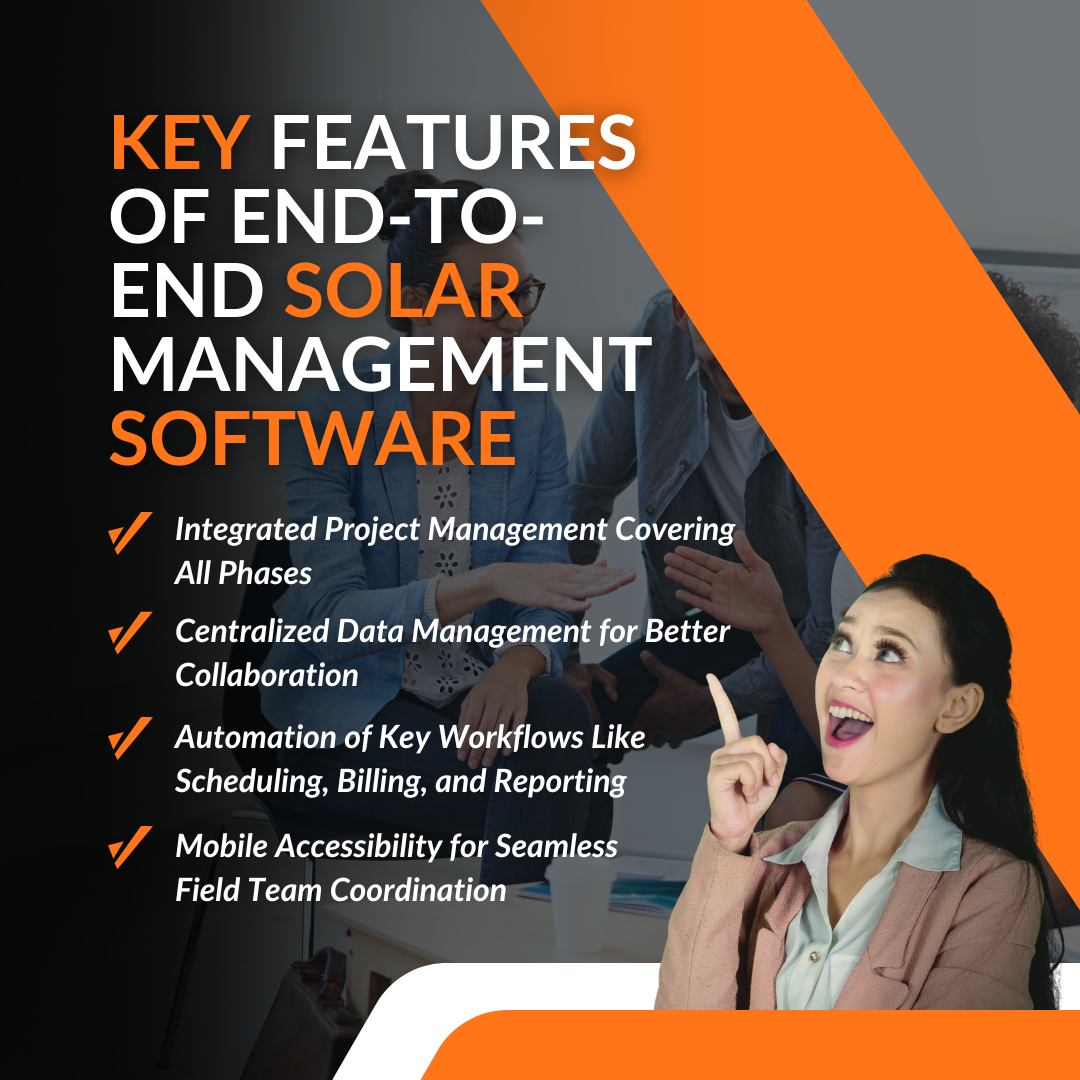
1. Integrated Project Management Covering All Phases
Solar projects involve multiple phases, from site assessment and designing solar installations to procurement, installation, and commissioning. The software:
- Provides specialized tools for solar companies and installers
- Enhances operational efficiency and project management
2. Centralized Data Management for Better Collaboration
A centralized data system offers:
- A single source of truth for project details, customer records, and financials
- Role-based access control to ensure secure data handling
- Instant synchronization between field teams, solar installer's office staff, and suppliers
3. Automation of Key Workflows Like Scheduling, Billing, and Reporting
Manual processes increase the risk of errors and delays in solar projects.
- Provides real-time data analysis and performance visualizations
- Improves solar generation, self-consumption, and storage efficiency
4. Mobile Accessibility for Seamless Field Team Coordination
Field teams need real-time access to project details, work orders, and site updates. With mobile integration, EPCs can:
- Allow technicians to modify work status and sales mode on-site
- Take and upload pictures directly from the field
- Receive instant alerts and notifications on project changes
Here's a blog if you are Expanding Your Market Reach: Strategies for Solar EPC Companies.
Benefits of Implementing End-to-End Solar Management Software
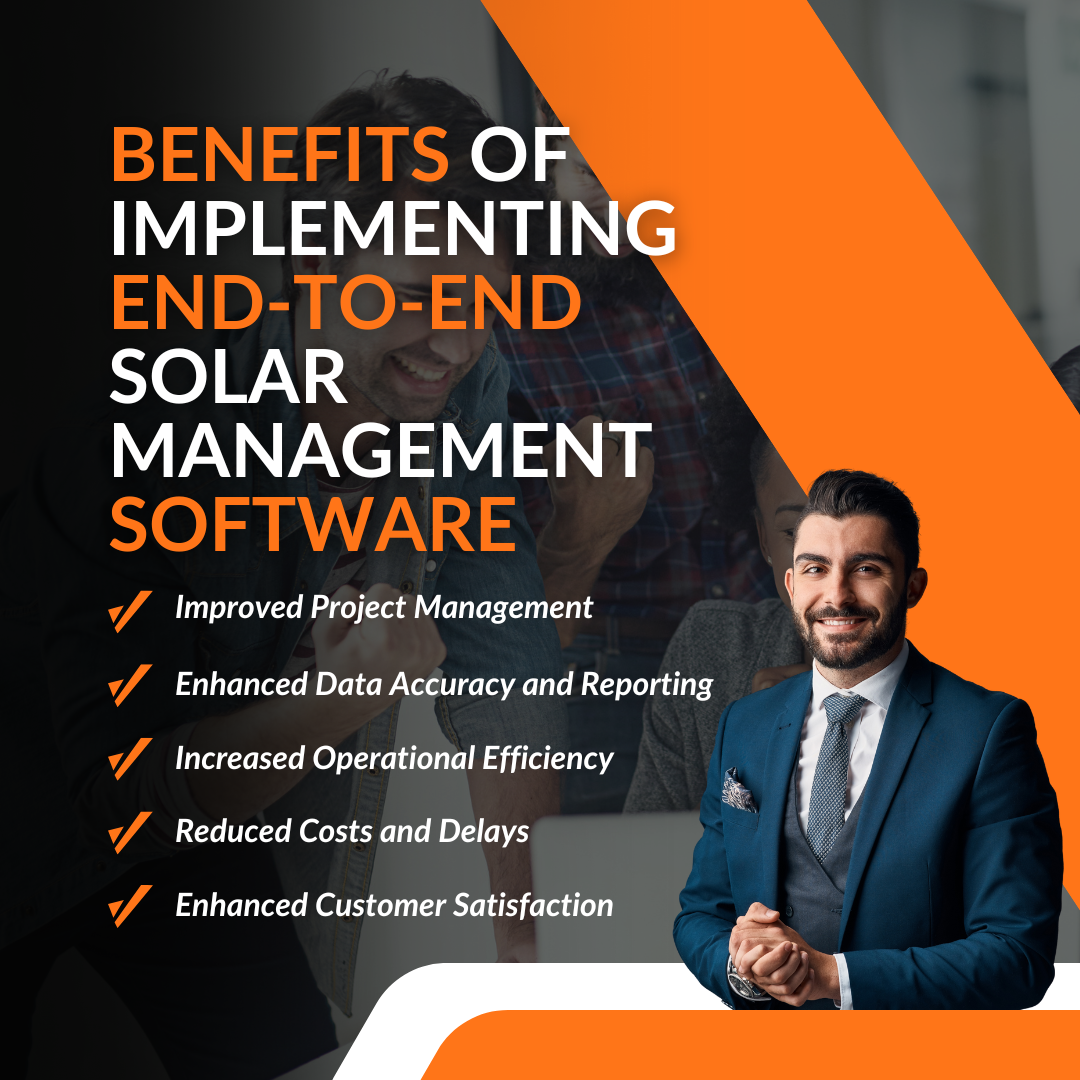
EPCs in the solar industry face constant challenges; implementing software addresses these issues by providing a centralized, automated, and smart approach to project management. Here’s how
EPCs benefit from adopting this technology.
1. Improved Project Management
Managing solar projects involves multiple stakeholders, timelines, and resources. A robust software solution improves overall project management by ensuring:
- Real-time project tracking enhances visibility and ensures deadlines are met. Project managers can monitor progress at every stage, reducing delays.
- Streamlined workflows prevent bottlenecks and keep teams aligned. Automated task assignments and milestone tracking keep projects moving smoothly.
- Enhanced resource allocation reduces waste and optimizes material procurement. With better planning tools, EPCs can efficiently distribute labor, materials, and equipment.
2. Enhanced Data Accuracy and Reporting
Reliable data is critical for making informed decisions in solar project management. The software enhances data accuracy and reporting through:
- Automated data collection minimizes human error. Digital data entry and system integrations reduce the chances of discrepancies.
- Customizable dashboards provide real-time performance insights. EPCs can track metrics like cost, productivity, and energy data output from a single interface.
- Data-driven decision-making leads to more effective strategies. Predictive analytics help identify trends, forecast risks, and optimize future projects.
3. Increased Operational Efficiency
EPCs frequently face challenges with isolated communication and ineffective field operations. Solar management software enhances operations by:
- Automated workflows decrease manual reliance, streamlining scheduling, billing, and reporting to minimize administrative burdens.
- Better field team coordination, improving on-site execution. Mobile accessibility ensures that field technicians receive real-time updates and instructions.
- Fewer errors and rework resulting in smoother project completion. Standardized processes ensure consistency, reducing costly revisions.
4. Reduced Costs and Delays
Cost overruns and project delays are common issues in solar EPC operations. A well-integrated software system helps mitigate these risks by:
- Early risk identification prevents cost overruns. Advanced analytics help EPCs detect potential issues before they escalate.
- Optimized inventory management, preventing material shortages. Automated stock tracking ensures that necessary components are always available.
- More efficient project scheduling, keeping timelines on track. Smart scheduling tools assign tasks based on available resources, reducing downtime.
5. Enhanced Customer Satisfaction
A seamless customer experience is crucial for building trust and long-term relationships. Solar management software enhances customer satisfaction through:
- Transparent project updates, keeping clients informed. Customers can track project progress through portals, emails, or mobile notifications.
- Faster response time, improving customer support. Automated ticketing and CRM integration ensure that client inquiries are handled efficiently.
- More professional interactions boost credibility. Digital documentation, automated contracts, and structured communication enhance professionalism.
Providing a better customer experience increases referrals, repeat business, and a strong reputation in the solar industry.
Explore Integrating Solar Design Software with CRM: A Unified Approach for EPC Companies.
What makes Sunbase the Ultimate Solution for Solar EPC Companies?
Here's why Sunbase is the best solution for you:
- All-in-one Solution: Sunbase's cloud system makes your solar business more efficient and profitable. Its CRM automates tasks like time tracking, job scheduling, and sales processes, freeing up resources and enhancing workflow efficiency.
- Solar Design Management: Offers a comprehensive solution for managing all aspects of solar project design including solar moni, ensuring accuracy and efficiency.
- Seamless Proposal Generation: This tool simplifies the creation of professional, accurate proposals, highlighting energy savings, project costs, and installation timetables.
- Integration with Other Solar Tools and Platforms: Seamlessly integrates with other solar technologies and platforms, ensuring seamless data synchronization.
- Precise Energy Production and Offset Simulation: Its advanced simulation tools generate precise energy production predictions, optimizing designs for optimal efficiency.
Take a look at the Top 10 Reasons Solar EPC Companies Choose Sunbase Solar Design Software.
Conclusion
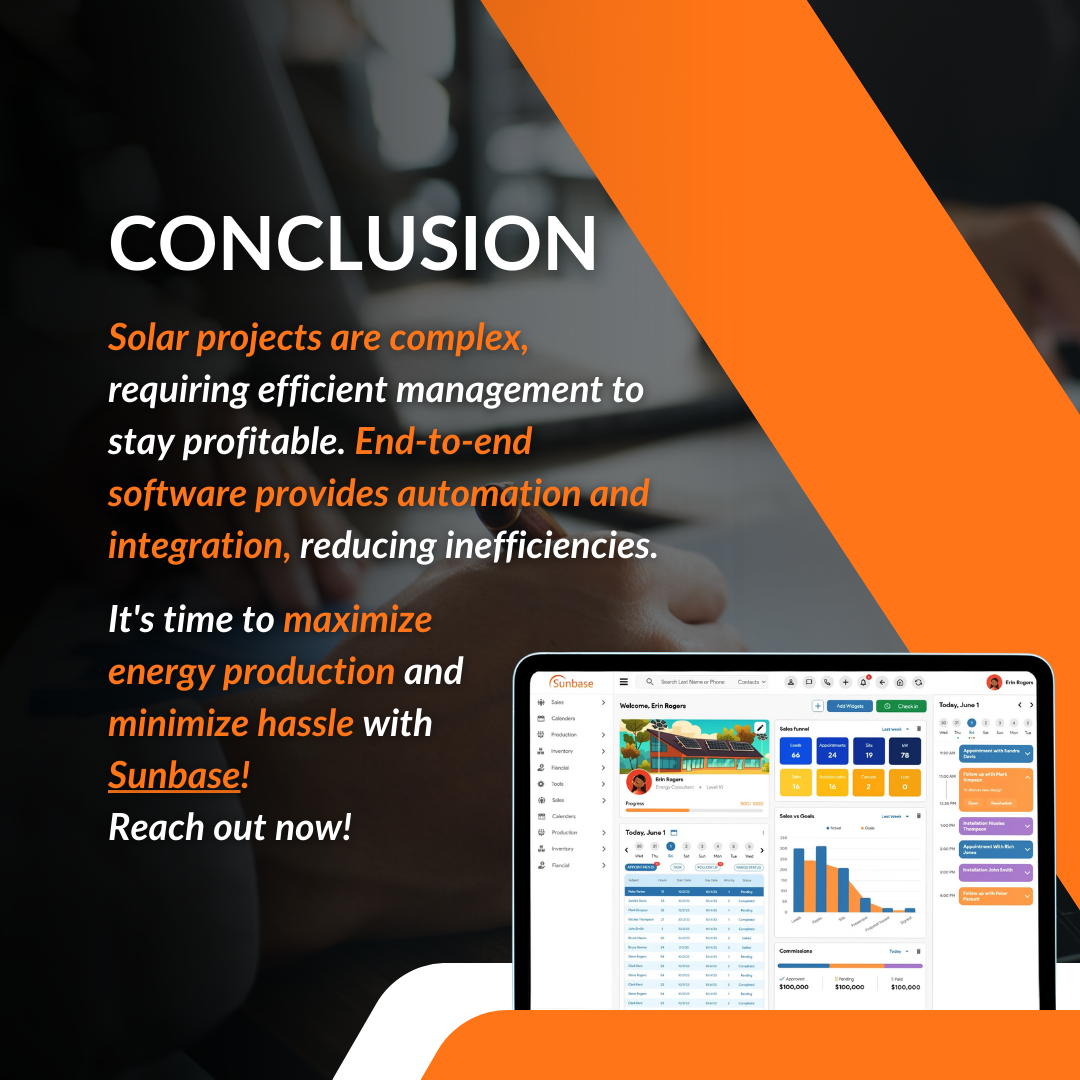
Solar projects are complex, requiring efficient management to stay profitable.
In a competitive market, EPC companies must embrace digital transformation to improve the sales process efficiency, reduce costs, minimize system downtime, and scale operations effectively.
Are you prepared for the transition?
About Sunbase
Why juggle multiple tools when you can have them all in one place?
It's time to maximize energy production and minimize hassle with Sunbase! Reach out now!
Frequently Asked Questions
Q1. What is the purpose of integrating solar design software with CRM for EPC companies?
Integration streamlines sales, design, and operations, boosting efficiency, productivity, and growth.
Q2. What role does CRM integration play for EPC companies?
CRM integration enhances customer satisfaction by centralizing communication, monitoring client interactions, and expediting the bidding and proposal process.
One Platform. Zero Chaos. Run Your Entire Business in One Place.
Sunbase replaces your CRM, proposals, scheduling, job tracking, and reporting tools — all inside one clean, connected platform.
About Sunbase
The All-In-One Platform to Run Your Entire Business
Sunbase helps you organize operations, streamline daily workflows, and manage everything - from first customer contact to final project deliver- in one connected system.
Our Mission
- Organize your business.
- Optimize your workflow.
- Automate what slows you down.
Why Businesses Choose Sunbase
One Connected Workflow
Replace scattered tools and manual processes with a single platform that brings together your team, tasks, customers, jobs, and performance data.
🌎 Global Presence
Serving the United States, Canada, India, LATAM, Australia, and 10+ international markets.
👥 11,000+ Users
Trusted by contractors, installers, project managers, sales teams, and field technicians.
🏗️ Built for All Sizes
From small contracting teams to fast-growing enterprises, Sunbase adapts to your workflow.
Useful Links For You
Stop Managing Your Business Manually. Automate It.
Sunbase automates workflows, reduces mistakes, and helps your team get more done - without hiring extra staff or juggling multiple tools.



